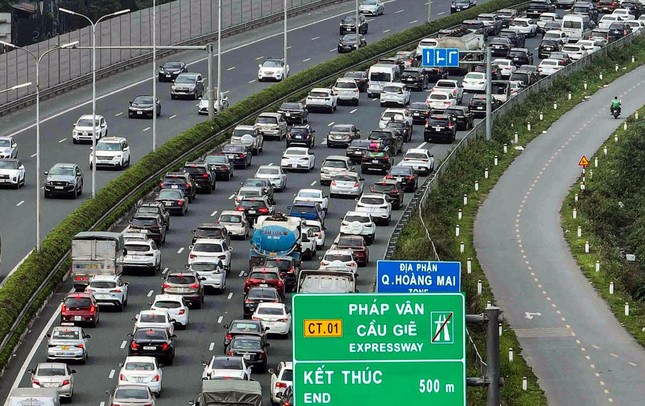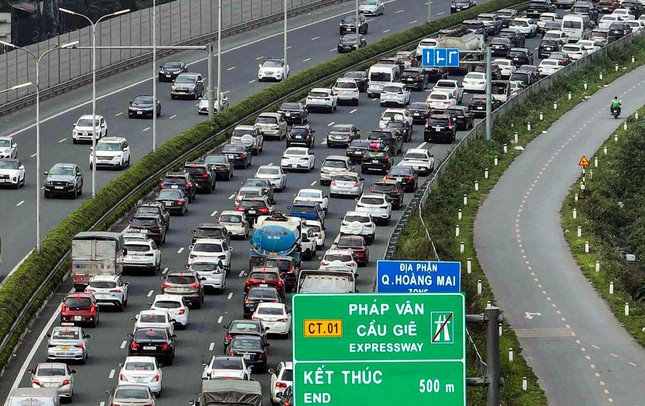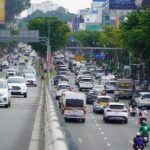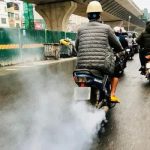Social media has been abuzz with information about a potential ban on old cars from entering the inner cities of Hanoi and Ho Chi Minh City. Mr. Le Xuan, a resident of Long Bien, Hanoi, shared that his family owns a car produced in 2016, which they use daily for commuting to the Hoan Kiem district for work and school.
“If the rumored ban on cars produced before 2017 is true, it would disrupt our family’s routine. I hope that if such a ban is implemented, the Hanoi government will develop alternative means of transportation such as electric buses or the proposed overhead train projects to ensure convenience for citizens while also addressing environmental concerns,” Mr. Xuan expressed.

Cars entering the inner city of Hanoi. Photo: Nguyen Duc
Mr. Xuan’s concerns echo the worries of many residents in Hanoi and Ho Chi Minh City who rely on older vehicles for their daily commute. According to Tien Phong newspaper’s investigation, the source of this information stems from the Ministry of Natural Resources and Environment seeking feedback on a draft decision regarding the timeline for implementing emission standards for circulating cars in Vietnam. The new standards are expected to categorize car emissions into five levels, corresponding to the Euro standards. Notably, the draft does not mention banning cars based on their production year but rather proposes emission standards depending on the year of manufacture.
The proposed content suggests that cars produced from 2017 onwards and registered in Hanoi and Ho Chi Minh City may need to comply with emission standard level 4 from the beginning of 2026. For cars produced from 2022, if registered in these two cities, they will be subject to level 5 standards from the start of 2027. Thus, the issuance of license plates for cars in Hanoi and Ho Chi Minh City will be based on their emission inspection levels.
While the benefits of the new emission policy are undeniable, experts and citizens alike are hopeful for supportive policies to ease the burden on car owners. Vietnam can draw from the experiences of other countries in implementing policies that encourage the exchange of old cars for new ones or promote the use of green fuel vehicles.
Automotive engineer Le Van Tach expressed his full support for the new emission standards for cars. However, he suggested that alongside these standards, authorities should deny registration to old and poorly maintained vehicles that contribute significantly to environmental pollution.
“Implementing emission standards for cars to reduce environmental pollution is reasonable. Nonetheless, I disagree with the differentiation based on license plate numbers and the application of varying standards,” stated Mr. Tach.
The Ministry of Natural Resources and Environment cited statistics from the World Bank, indicating that air pollution in Vietnam has caused annual losses of 5-7% of GDP. In Hanoi, the estimated cost of respiratory treatment and economic losses due to sick leave for inner-city residents amounts to 1,500 VND per person per day, totaling approximately 2,000 billion VND per year.
One of the primary contributors to air pollution is the operation of road transport vehicles. Research by environmental experts reveals that the proportion of pollution caused by traffic ranges from 20-60%.
The Environmental Agency Speaks Out on Emissions Standards for Vehicles in Hanoi and Ho Chi Minh City
The bustling cities of Hanoi and Ho Chi Minh City are in dire need of a greener future. To combat the looming threat of air pollution, it is imperative that these metropolises expedite the implementation of stricter emission standards for automobiles. It is high time that we prioritize the health and well-being of our citizens and our planet.
No Ban on Pre-2017 Vehicles in Hanoi and Ho Chi Minh City
“Tightening emission standards for vehicles in Hanoi and Ho Chi Minh City have many car owners worried.”
Unleashing the Power of Domestic Auto Incentives
The Ministry of Industry and Trade has high hopes for the automotive market, targeting a scale of over 1 million vehicles per year by 2030, with a focus on supporting the development of electric vehicles. This ambitious plan aims to revolutionize the industry, and with it, the writing must also evolve to capture the imagination of the audience.
The New Regulations for Motorcycles: Will Tens of Millions Be Lined Up to Comply by 2025?
The mandatory emission testing regulation for all motorcycles has been passed into law as part of the Road Traffic Order and Safety Act.











![[Photo Essay]: Experts, Managers, and Businesses Unite to Forge a Path Towards Sustainable Green Industry](https://xe.today/wp-content/uploads/2025/07/z678592918-150x150.jpg)


![[Photo Essay]: Experts, Managers, and Businesses Unite to Forge a Path Towards Sustainable Green Industry](https://xe.today/wp-content/uploads/2025/07/z678592918-100x70.jpg)






